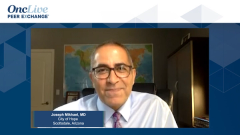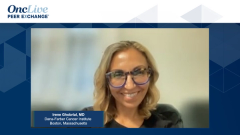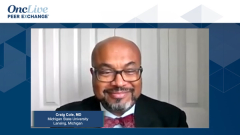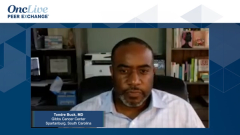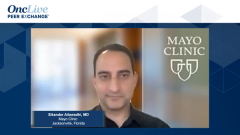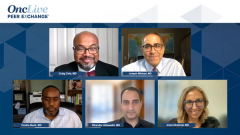
Improving Access to Clinical Trials in Multiple Myeloma
Centering discussion clinical trials in multiple myeloma, panelists review how to improve access to these studies for racial and ethnic minority groups.
Episodes in this series

Transcript:
Joseph Mikhael, MD: Irene, you have led and continue to lead multiple clinical trials and have done so much of your work in academia. What are some of the things- and we'll let everybody chime in as well, too, but what are some of the solutions to this clinical trial challenge that Craig had mentioned? That right now, roughly 20% of myeloma patients in this country are African American or Black, but the average clinical trial is somewhere between 6 to 7%. If we look at those studies that have led to regulatory approval, those pivotal studies, that number is more like 2 to 3%. By contrast, we just saw presented at ASCO, [American Society of Clinical Oncology] the determination trial which was 19%. It was one of the first to get that high, let alone a phase 3 study. I know people write books on this subject now, and I'm asking you to tell me. What are some of the things that come to mind that we need to be clearly addressing to improve the access to clinical trials for African Americans?
Irene Ghobrial, MD: You're right, we can write books. And Craig put it beautifully in so many ways. It's access to the clinical trials close to you, ability for you to reach that place. Because if you can't drive there, if you can't get any close enough to the center or take a day off, then there's a problem. Inclusion in clinical trials, because if you have anemia or some renal insufficiency or neutropenia, and you cannot meet the inclusion criteria that are very strict and were meant for numbers that are not supposed to be for the typical numbers that we would have for our patients, then that would exclude you. And then that ability to communicate with the patient and explain to them what is needed to be on the trial and having them trust you and have confidence in you that you're providing for them something important. Especially clinical trials and having and gaining that trust is very critical.
Joseph Mikhael, MD: You've covered some of these, and I can see that Craig is on the edge of his seat. So you go, Craig.
Craig Cole, MD: I was involved in a focus group for African American myeloma patients, for barriers and facilitators of clinical trials. And what we saw was that the big 3 things that discouraged patients, Black patients, to going to clinical trials was fear of randomization, fear of adverse effects and fear of placebo, and some distrust of the medical system. And knowing that those are barriers, and that's the conversation. That's the conversation that you have with your patient. One conversation I have with my patients on clinical trials is talking about fear of randomization, fear of a placebo. The facilitators of clinical trials are understanding potential adverse effects. Understanding, having the healthcare team speaking to you about clinical trials. Patients want to hear about clinical trials, compensation for transportation, and working at those logistics to put patients on clinical trials. And then making sure that when we enroll patients on clinical trials, that we engage the family. 61% of patients said that it was important to have their family engaged when making decisions about clinical trials. That's a piece of cultural competency that we need when we discuss clinical trials with our patients.
Joseph Mikhael, MD: Thank you. Can I just emphasize that point for a minute because that's something that I've come to learn and appreciate with multiple cultures, with all of us. But with anyone, as you mentioned, in the African American community, that can be as simple if you're a clinician listening tonight, that can be as simple as saying you're having a conversation with a patient. And whether it's starting bortezomib, or starting on a clinical trial or a transplant of saying, is there someone close and important to you that should be here when we have this discussion? Whether it's a brother or a sister, an uncle, an aunt, a pastor or whomever it is, that person doesn't want to make that decision until that person is with them. Having the sensitivity to ask that question could make a difference.
Craig Cole, MD:That is important for communities of color, engagement of their family. I have my nurse. When we have African American, Latino patients come to our clinic, I make sure to ask our nurse, could you give him a call to make sure if he comes for his return visit, to engage his family? Because a lot of matriarchal built families, the matriarch doesn't want to engage the rest of the family, they’re keeping that information to themselves. Help them. Help your patient engage the family, and then you can get the medications and get them on clinical trials which is important.
Joseph Mikhael, MD: It’s so helpful. This is great, Craig. Thank you for that. The other point I get to make about clinical trials that was raised was interesting. The paper was just published out of blood advances. This last week was the DRIVE Program out of Indianapolis where the D in DRIVE was for a Diversity Officer. This is something that may be very wise to start thinking about incorporating someone who is tasked with looking at the trial at large. Irene mentioned sometimes, it’s entry criteria. Has that been looked at appropriately? We still have some things archaic in our clinical trials that are still there. Artificial cutoffs for creatinine or artificial cutoffs for different things that maybe could be removed. That same person can look and say well, does the trial allow for a transportation fee if that person needs to be transported? And not just, as we said before, pure transportation. Sometimes, it's family care. It’s senior care. It’s childcare. It's others to facilitate that person being there. Even a meal ticket very often. A dear patient of mine who, if it weren't for the fact that we provided a meal at his infusion, I don't know if he would have a meal that day. It made us very appreciative of the some of the simple things that we so often don't take for granted. Those are just some of the elements in the pieces. The last thing maybe I'll say about trials before we come to our last piece of physician bias is, is the recognition everybody has said today, this isn't just at the level of the clinic or the center. This is at the governmental level. At the FDA, within industry, within the community at large, that kind of partnership is needed. If there isn't a commitment to do that, then it's not going to move forward as quickly.
Transcript edited for clarity.


